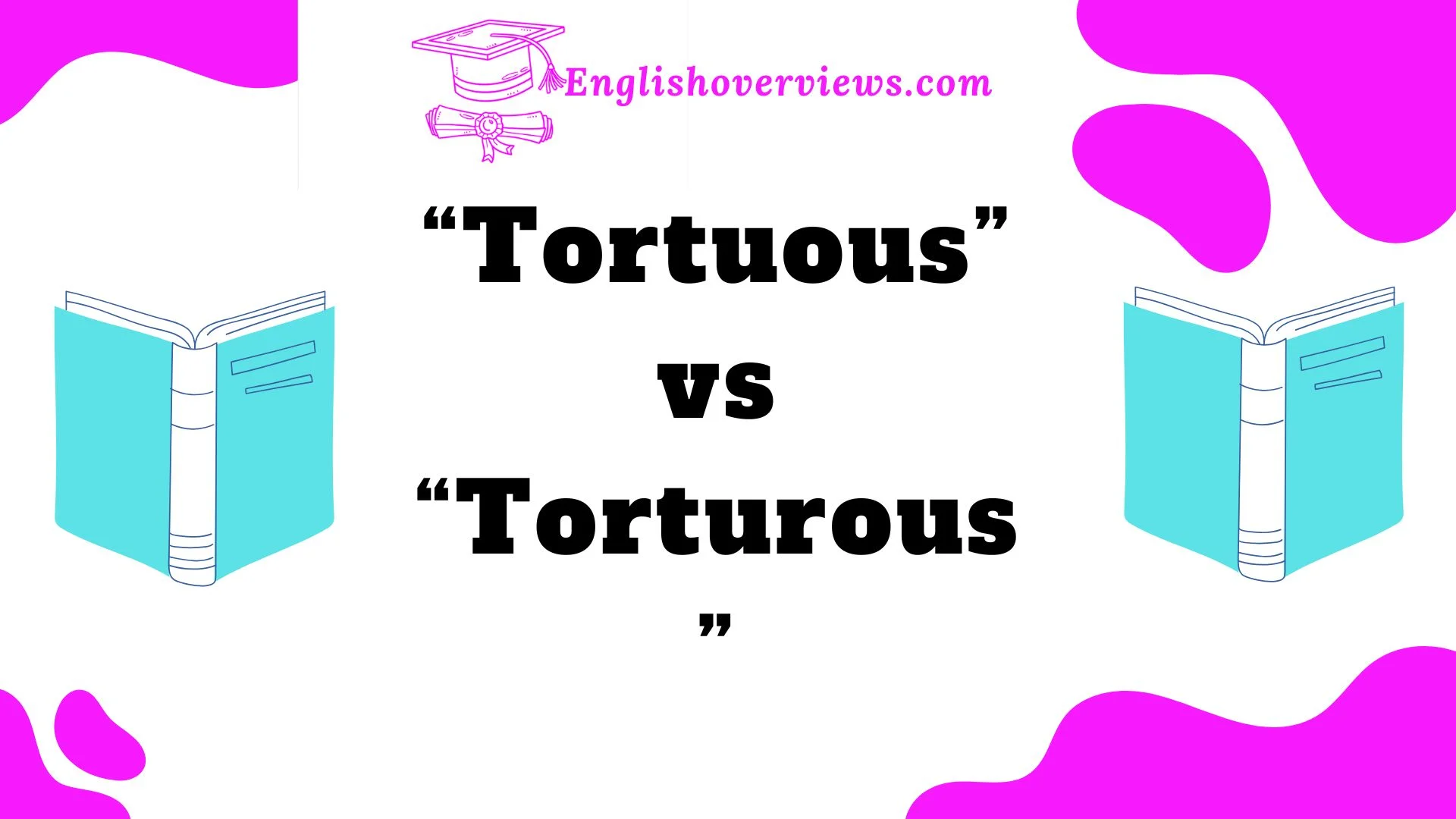Ever stumbled over words that look alike but mean entirely different things? “Tortuous” and “torturous” are two such culprits. They might share a root word and sound similar, but their meanings couldn’t be more distinct. Confusing them can make a message go from clear to utterly misleading.
In this guide, we’ll explore the meanings, origins, and uses of “tortuous” and “torturous.” Along the way, we’ll dissect real-world examples, clear up common misuses, and even introduce you to their lesser-known cousin, “tortious.”
Whether you’re a writer, student, or language enthusiast, this blog post will ensure you can confidently navigate these tricky words. Let’s untangle these twists and turns!
Understanding “Tortuous”: A Twist in Language
What Does “Tortuous” Mean?
The word “tortuous” describes something that is full of twists, turns, or complexity. It can be used literally or metaphorically to highlight winding paths, intricate arguments, or convoluted processes.
For example:
- A tortuous mountain trail winds back and forth with sharp curves.
- A tortuous legal case involves layers of complex arguments and unexpected twists.
Key takeaway: Think “twists” when you hear “tortuous.”
Etymology: The Latin Connection
“Tortuous” comes from the Latin word “tortus,” meaning twisted or winding. Its root is “torquere,” which means to twist or to bend.
This connection explains why “tortuous” is often used to describe physical or metaphorical twisting paths.
Common Contexts for “Tortuous”
Let’s break down where “tortuous” fits in everyday language:
- Physical Descriptions
- Roads, rivers, or trails that bend repeatedly are described as tortuous.
- Example: “The tortuous road through the mountains had drivers gripping their seats.”
- Complex Arguments or Plans
- Ideas or strategies with many layers, dependencies, or detours.
- Example: “The lawyer’s explanation of the case was so tortuous that even the jury looked confused.”
- Processes and Systems
- Bureaucratic systems or workflows full of red tape.
- Example: “Applying for a visa can be a tortuous process, requiring dozens of documents and weeks of waiting.”
Real-World Example
In J.K. Rowling’s Harry Potter and the Goblet of Fire, the Triwizard Maze is a prime example of something “tortuous.” Its winding, confusing paths challenge the characters, mirroring the complexity of their personal journeys.
Painful Realities: Defining “Torturous”
What Does “Torturous” Mean?
The word “torturous” focuses on pain and suffering—physical, emotional, or psychological. Unlike “tortuous,” which emphasizes complexity, “torturous” evokes feelings of anguish or distress.
Examples:
- “The hike in 100-degree weather was torturous for the unprepared hikers.”
- “The student found the exam week torturous, filled with sleepless nights and stress.”
Key takeaway: Think “torture” when you hear “torturous.”
Etymology: Pain in the Roots
“Torturous” also stems from “torquere” (to twist), but its meaning shifted to reflect torment or torture. The word emphasizes the suffering caused by figurative or literal “twisting.”
Common Contexts for “Torturous”
- Physical Pain
- Long, grueling experiences.
- Example: “Running a marathon without training can be a torturous ordeal for your body.”
- Emotional or Psychological Distress
- Heartbreak, waiting, or anxiety.
- Example: “Waiting for the biopsy results was a torturous experience for the family.”
- Grueling Challenges
- Tasks or situations that test your limits.
- Example: “Climbing Mount Everest under harsh weather conditions is torturous for even the most seasoned climbers.”
Real-World Example
The Bataan Death March during World War II exemplifies “torturous.” Prisoners of war were forced to walk over 60 miles in unbearable conditions, facing physical pain, dehydration, and starvation.
Visual Aid: Comparison Table
| Aspect | Tortuous | Torturous |
| Definition | Winding, twisting, complex | Painful, grueling, involving suffering |
| Etymology | Latin: tortus (twisted) | Latin: torquere (to twist/torment) |
| Example Sentence | “The trail was tortuous.” | “The long meeting was torturous.” |
| Common Associations | Roads, arguments, processes | Pain, suffering, grueling tasks |
Comparing “Tortuous” and “Torturous”
Common Misuses
People often confuse these words because they look and sound similar. Here are some examples of incorrect usage:
- Incorrect: “The tortuous hike left me feeling sore and exhausted.”
- Correct: “The torturous hike left me feeling sore and exhausted.”
- Incorrect: “The torturous plot of the mystery novel was hard to follow.”
- Correct: “The tortuous plot of the mystery novel was hard to follow.”
Memory Aids
To avoid confusion, try these simple mnemonics:
- Tortuous = Twist: Imagine winding roads or twisted logic.
- Torturous = Torture: Think of pain, anguish, or torment.
The Rare Third: “Tortious”
What Does “Tortious” Mean?
“Tortious” is a legal term referring to civil wrongs or conduct that leads to harm, often resulting in lawsuits.
Example:
- “The company was sued for its tortious interference with another business contract.”
Legal Context
In legal terms, a “tort” is a civil wrong that causes harm. Tortious acts include:
- Negligence: Failing to act with reasonable care.
- Defamation: Spreading false information that damages someone’s reputation.
- Trespassing: Entering someone’s property without permission.
Example Case:
In the famous McDonald’s hot coffee case (Liebeck v. McDonald’s Restaurants), the plaintiff sued for tortious negligence after suffering severe burns from excessively hot coffee.
Tortious vs. Tortuous vs. Torturous
- Tortious: Legal wrongs.
- Tortuous: Twists and complexity.
- Torturous: Pain and suffering.
Real-World Examples and Pop Culture Misuses
- Media Misuse:
In a popular news article, the writer described a “tortuous breakup” when they meant “torturous.” The error shifted the meaning from emotional pain to something winding and complex. - Pop Culture:
In The Maze Runner series, the Labyrinth represents something tortuous due to its complex, winding design. However, the emotional toll on the characters makes their journey torturous as well.
When Both Apply
There are rare situations where something can be both tortuous and torturous.
For example:
- A mountain trail might be tortuous because it’s winding and indirect, but also torturous if it’s physically grueling and exhausting.
FAQs
1. What’s the difference between “tortuous” and “torturous”?
“Tortuous” refers to twists and complexity, while “torturous” describes pain and suffering.
2. Can something be both tortuous and torturous?
Yes, situations like a grueling and winding mountain hike can be both.
3. What does “tortious” mean?
“Tortious” is a legal term that refers to civil wrongs, like negligence or defamation.
4. How can I avoid confusing these terms?
Use memory aids like “twist for tortuous” and “torture for torturous.”
5. Are these terms interchangeable?
No, they have distinct meanings and should not be used interchangeably.
Conclusion
The English language is full of twists and turns—sometimes literally! By understanding the distinct meanings of “tortuous,” “torturous,” and “tortious,” you can communicate with precision and clarity. Remember: twists are tortuous, pain is torturous, and legal wrongs are tortious.

English Overviews is a resourceful website dedicated to providing valuable content related to grammar and vocabulary. AD has made notable contributions, sharing insights on various subjects, including WordPress themes and plugins. The primary goal of the site is to help users improve their English language skills effectively.











